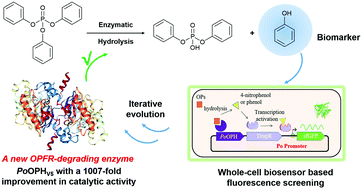Reshaping the active pocket of promiscuous lactonases for degrading bulky organophosphate flame retardants†
Abstract
Engineering of a promiscuous lactonase via semi-rational evolution gave a 1007-fold improvement in its catalytic activity in the degradation of triphenyl phosphate (TPHP). TPHP is a typical bulky organophosphate flame retardant (OPFR) and is widely used in industry. To the best of our knowledge, this is the first artificial enzyme capable of degrading OPFRs.

- This article is part of the themed collection: Chemical Communications HOT articles


 Please wait while we load your content...
Please wait while we load your content...